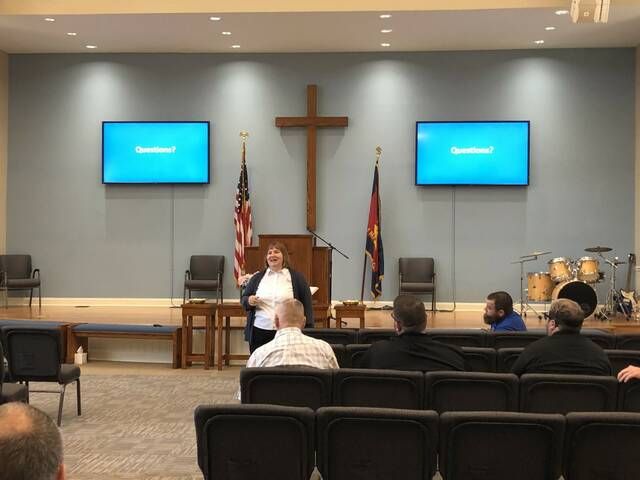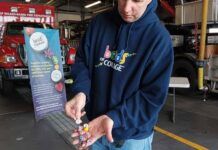
Joan Pierce, program administrator at the Salvation Army’s Adult Rehabilitation Center on New Hill Street in Wilkes-Barre welcomed guests to an open house Thursday to learn about the facility and the programs it offers.
Jerry Lynott | Times Leader
‘We have a program that can help a lot of people if they knew about it’
Click here to subscribe today or Login.
WILKES-BARRE — Joan Pierce can no longer keep a secret about the Salvation Army’s Adult Rehabilitation Center.
The administrator of the program at the facility on New Hill Street, Pierce welcomed approximately 25 guests Thursday morning during an open house to spread the word about it.
“All of us know about the opioid epidemic and the skyrocketing number of overdose deaths in our nation and we believe that we have a program that can help a lot of people if they knew about it. So that’s why we’re here,” said Pierce.
An envoy with the Salvation Army, Pierce presented a brief slideshow about the men’s program and introduced co-workers, some who participated in it, to tell their success stories.
“We don’t want it to be a secret any longer,” Pierce said.
The Wilkes-Barre facility, one of 29 rehabilitation centers the Salvation Army operates in the northeastern U.S., has the capacity to accept 64 men into the Christian-centered program that provides a place to live and opportunities for work and spiritual growth. The program, free for those who have no income, lasts between six months to a year, depending upon an individual’s progress through the four phases of orientation, education, investment and regression prevention. Graduates can also receive short-term transitional assistance to help them find work and housing.
“What we offer here is good structure and guidance,” said staff member Stanley Jackson.
Often someone who comes into the program has to begin a daily routine that includes simple things like washing their face and getting up in the morning, he said.
“We see progress, no matter how minute it may be,” Jackson said.
Lentford “Mike” Handy came up from Delaware and, after finishing the program, stayed to work as a cook at the center.
“I gave my life, my will to Christ that’s the first thing I did,” said Handy.
Most of the approximately 30 men at the center that relocated from Hazle Street in 2011 have been referred by agencies. The center also accepts walk-ins. Background checks and a mental health assessment are done by the center’s staff.
Reach Jerry Lynott at 570-991-6120 or on Twitter @TLJerryLynott.







